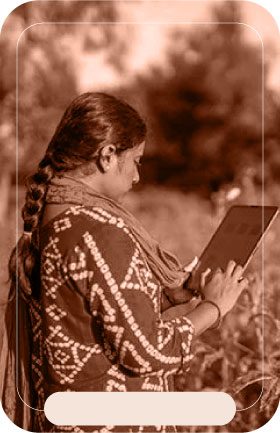Sanmati (सन्मति): Reimagining Women’s Work in the Digital Economy

Project Lead
Project Team
Location
Partners

Partner
The/Nudge Institute

The Rise of India’s Digital Economy
The global shift toward a digital economy is transforming how work is created, performed, and valued. In India, this transformation is accelerating, driven by a young, tech-savvy population, over 800 million internet users, and a projected $1 trillion digital economy by 2029.
Digital platforms, AI-powered services, and the rapid expansion of India Stack are opening new frontiers of employment, particularly within data value chains—from data collection and labeling to moderation, curation, and AI deployment.
An Emerging Opportunity for Women
India is on the cusp of an AI and data-driven transformation. The data labeling and annotation market alone is projected to reach USD 17 billion by 2030 (GrandViewResearch, 2022). But unless we build inclusive pathways into these sectors, we risk replicating the same patterns of exclusion that have marked previous waves of technological change.
Yet, these opportunities are not equitably distributed. Deep-rooted gender norms, limited digital literacy, infrastructural gaps, and safety concerns continue to keep many women—especially in rural and underserved regions—on the margins. The field lacks rigorous research, with little consensus on how to define concepts such as data value chains or microwork, and even less attention to how women can be equitably integrated into these systems of value creation.

Research
Questions
Reimagining Women’s Participation
Sanmati is a multi-partner initiative that seeks to build a deeper understanding of how women can meaningfully participate in data value chains, and by designing pathways that combine skills, autonomy, safety, and economic agency. Now in its second phase, this collaborative initiative is led by the Gender x Digital hub and The/Nudge Institute, with support from the Gates Foundation.
Through this initiative, we will build the evidence base around three core areas:
- How is digital work defined, structured, and who participates?
- Map definitions, classifications, and key actors in the digital work ecosystem, with a focus on women’s roles and representation.
- How are emerging work models, AI, and data value chains reshaping opportunities?
- Examine new models, such as microtasking, AI-enabled crowdwork, and tech-mediated gig work and assess their implications for India’s labour market.
- What will it take to unlock and scale women’s participation in digital work?
- Identify barriers, strategic levers, and gender-inclusive pathways across policy, design, and programmes that enable women to participate in the digital economy meaningfully.
Approach
The initiative takes a multi-pronged approach to understanding and shaping women’s participation in digital work. This includes mapping and analysing data value chains in India and globally, and identifying inclusive, ethical work models that expand opportunities for women. It will examine barriers and enablers to participation, reviews relevant policy frameworks and skilling ecosystems, and develops a typology and taxonomy to categorise digital work and workers. Insights will be translated into interventions and solutions that will be piloted with partners on the ground.
Reimagining Women’s Participation
Sanmati is a multi-partner initiative that seeks to build a deeper understanding of how women can meaningfully participate in data value chains, and by designing pathways that combine skills, autonomy, safety, and economic agency. Now in its second phase, this collaborative initiative is led by the Gender x Digital hub and The/Nudge Institute, with support from the Gates Foundation.
Through this initiative, we will build the evidence base around three core areas:
- How is digital work defined, structured, and who participates?
- Map definitions, classifications, and key actors in the digital work ecosystem, with a focus on women’s roles and representation.
- How are emerging work models, AI, and data value chains reshaping opportunities?
- Examine new models, such as microtasking, AI-enabled crowdwork, and tech-mediated gig work and assess their implications for India’s labour market.
- What will it take to unlock and scale women’s participation in digital work?
- Identify barriers, strategic levers, and gender-inclusive pathways across policy, design, and programmes that enable women to participate in the digital economy meaningfully.
Approach
The initiative takes a multi-pronged approach to understanding and shaping women’s participation in digital work. This includes mapping and analysing data value chains in India and globally, and identifying inclusive, ethical work models that expand opportunities for women. It will examine barriers and enablers to participation, reviews relevant policy frameworks and skilling ecosystems, and develops a typology and taxonomy to categorise digital work and workers. Insights will be translated into interventions and solutions that will be piloted with partners on the ground.


WOMEN +
DIGITAL WORK
Shape the Future of Women’s Digital Work With Us
We are seeking to collaborate with:
- Digital work platforms offering task-based or remote opportunities, including annotation, moderation, and data labelling.
- Social enterprises creating digital livelihoods for rural and underserved communities.
- Skilling organisations and NGOs focused on digital literacy and economic empowerment.
- Innovators developing ethical, gender-intentional models for digital work.


